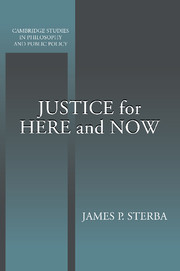Book contents
- Frontmatter
- Contents
- Acknowledgments
- 1 A Peacemaking Way of Doing Philosophy
- 2 From Rationality to Morality
- 3 From Liberty to Equality
- 4 From Equality to Feminism
- 5 From Feminism to Multiculturalism
- 6 From Anthropocentrism to Nonanthropocentrism
- 7 From Just War Theory to Pacifism
- 8 Conclusion: Justice for Here and Now
- Notes
- Bibliography
- Index
5 - From Feminism to Multiculturalism
Published online by Cambridge University Press: 08 January 2010
- Frontmatter
- Contents
- Acknowledgments
- 1 A Peacemaking Way of Doing Philosophy
- 2 From Rationality to Morality
- 3 From Liberty to Equality
- 4 From Equality to Feminism
- 5 From Feminism to Multiculturalism
- 6 From Anthropocentrism to Nonanthropocentrism
- 7 From Just War Theory to Pacifism
- 8 Conclusion: Justice for Here and Now
- Notes
- Bibliography
- Index
Summary
Despite its obvious importance, it would be a mistake to pursue feminist justice alone, given that it is both theoretically and practically connected to other forms of justice. Moreover, a peacemaking way of doing philosophy demands that we work out just such connections in order to build as broad a political consensus as possible. Accordingly, in this chapter, I will be focusing on both the theoretical and the practical connections of feminist justice to three other forms of justice: racial justice, homosexual justice, and multicultural justice.
THE THEORETICAL CONNECTION
While feminist justice seeks to remedy the injustice of sexism, racial justice seeks to remedy the injustice of racism, homosexual justice seeks to remedy the injustice of heterosexism, and multicultural justice seeks to remedy the injustice of Eurocentrism. As it turns out, each of these injustices is supported by similar theoretical arguments. The more blatant argument begins by noting certain differences among either individuals, groups, or cultures. It then claims that these differences are grounds for regarding some individuals, groups, or cultures as superior to other individuals, groups, or cultures. This superiority is then claimed to legitimate the domination of some individuals, groups, and cultures by other individuals, groups, and cultures. In each case, the theoretical argument moves from a claim of difference to a claim of superiority and then to a claim of domination. In the case of sexism, the biological differences between men and women, or other differences claimed to be linked to these biological differences, are said to be grounds for regarding men as superior to women; this superiority is then claimed to legitimate the domination of women by men.
- Type
- Chapter
- Information
- Justice for Here and Now , pp. 101 - 124Publisher: Cambridge University PressPrint publication year: 1998



